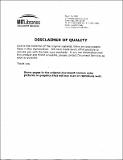The role of nonclassical MHC class I products in the development and function of CD8+ T cells
Author(s)
Halme, Dina Gould, 1974-
DownloadFull printable version (13.32Mb)
Alternative title
Role of nonclassical major histocompatibility complex class I products in the development and function of CD8+ T cells
Other Contributors
Massachusetts Institute of Technology. Dept. of Biology.
Advisor
Hidde L. Ploegh.
Terms of use
Metadata
Show full item recordAbstract
Major histocompatibility complex (MHC) class I products present pathogen-derived peptides to CD8+ cytotoxic T cells. This interaction mediates the detection and clearance of intracellular infections. Emphasis has been placed on the critical role of classical class I MHC products in the development and function of CD8+ T cells. In this thesis, I demonstrate that nonclassical class I products also play an important role in the development and function of CD8+ T cells. Experiments using TAP1-/- or β2m-/- mice do not distinguish between the involvement of classical and nonclassical class I products. KbDb-/- mice are deficient in the expression of classical class I products but continue to express nonclassical class I products, providing a unique opportunity to examine the relative contributions of these types of molecules to immunity. Although the majority of CD8+ T cells found in the periphery and female reproductive tract are dependent on classical class I for their development, a small but significant population of CD8+ T cells are found in these tissues in the absence of classical class I products. These CD8+ T cells, which mature in KbDb-/- but not β2m-/- mice, are therefore dependent on the expression of nonclassical class I products for their maturation. In contrast, the majority of CD8cαα+ TCRαβ intestinal intraepithelial lymphocytes (iIELs) develop independently of classical class I expression and are dependent on the nonclassical class I product Qa-2 for their maturation. (cont.) The 2C TCR has been described as restricted to the classical class I product Kb. However, we demonstrate that 2C TCR+ T cells can develop in the absence of Kb molecules, but not in 2m-/- mice, and therefore must require a nonclassical class I product for their maturation. These nonclassical class I-dependent 2C T cells are found in fetal thymic organ cultures, neonatal thymi, and the intestine of adult mice. We also demonstrate that CD8+ T cells restricted to nonclassical class I products provide full immunity against secondary lethal infections with Listeria monocytogenes. These nonclassically-restricted T cells expand disproportionately in KbDb-/- mice and are activated by Listeria-derived antigens presented by H-2M3 and CD1d.
Description
Thesis (Ph.D.)--Massachusetts Institute of Technology, Dept. of Biology, June 2002. "May 2002." Includes bibliographical references.
Date issued
2002Department
Massachusetts Institute of Technology. Department of BiologyPublisher
Massachusetts Institute of Technology
Keywords
Biology.